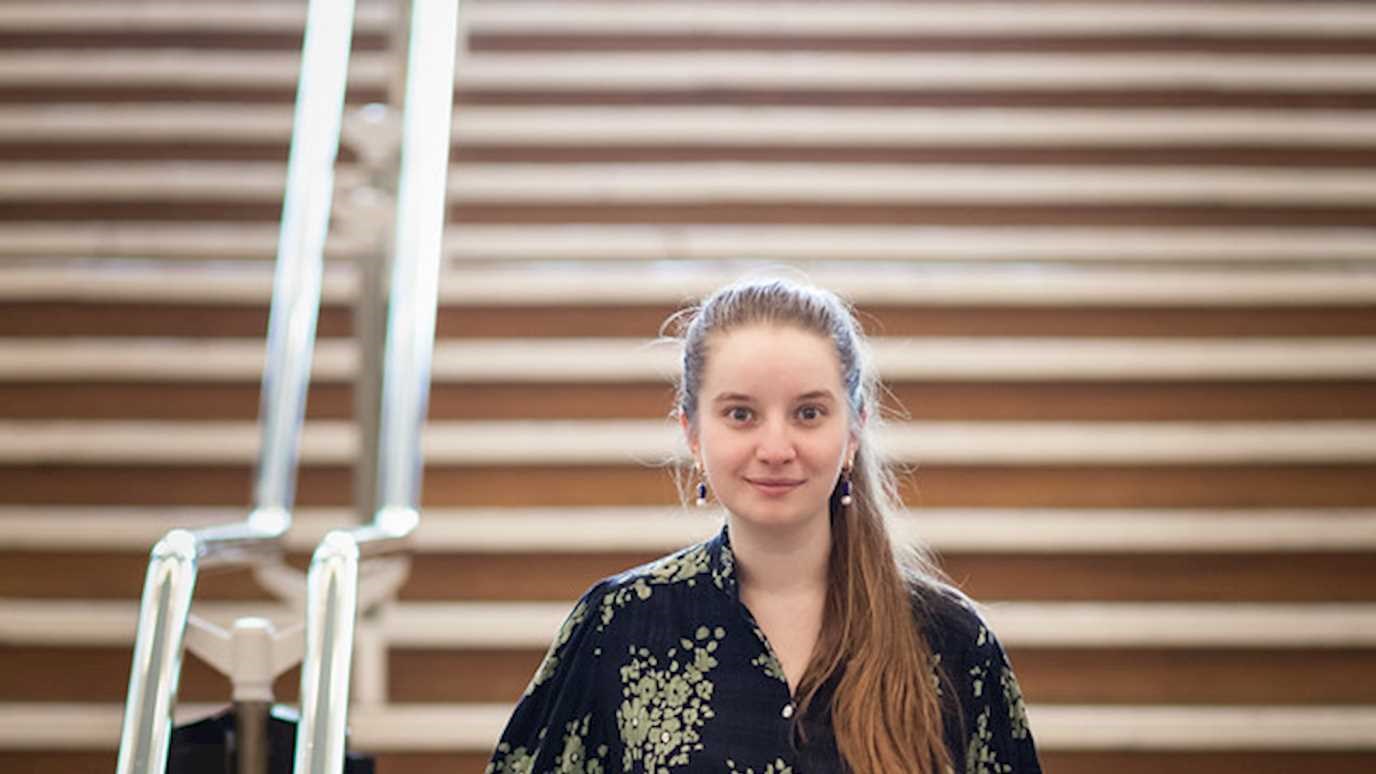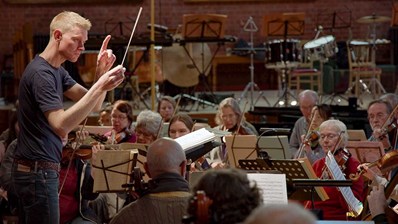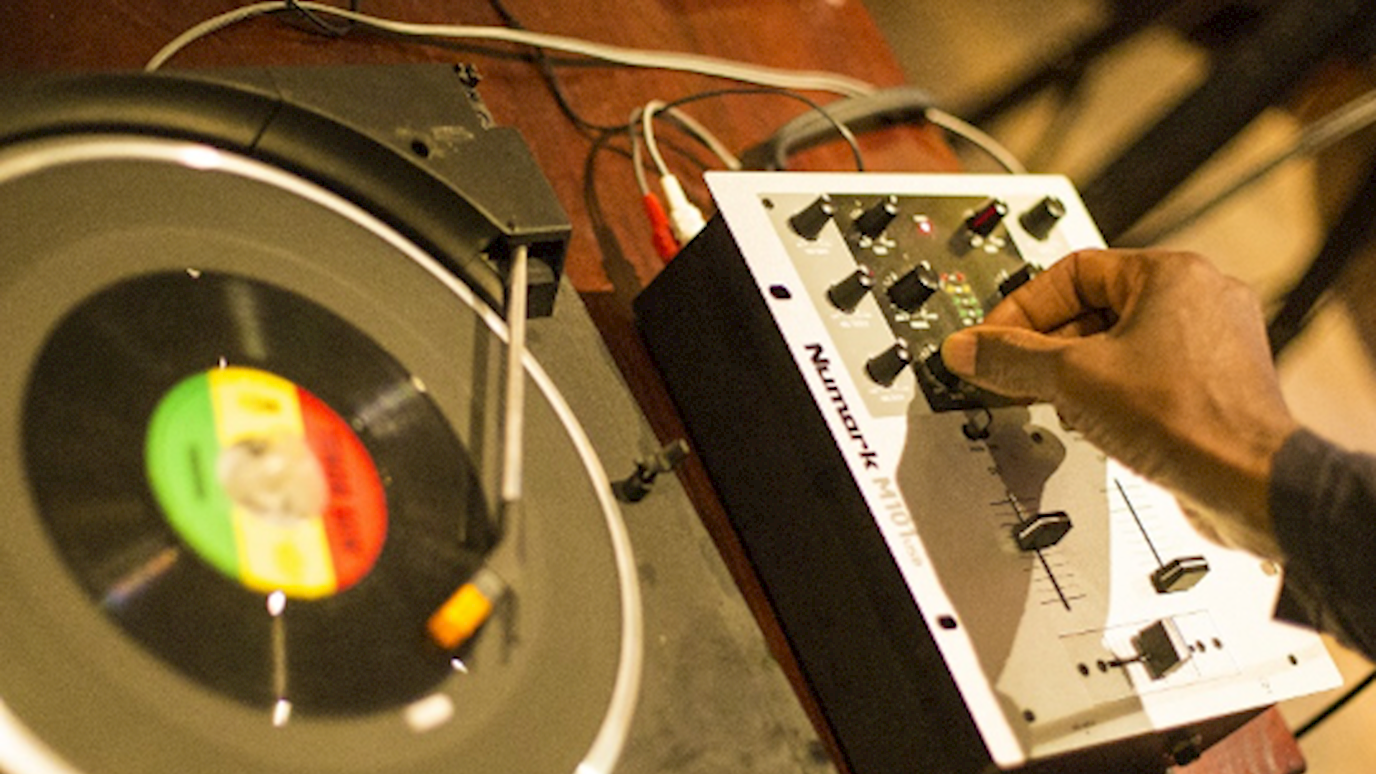Many of our alumni have made music part of their everyday professional lives.
The Music Department helps equip alumni for exceptional careers in music – whether it’s in professional performance, teaching or management – as well as a wide variety of other sectors. Our alumni have achieved enormous success on the world stage.
Graduate profiles
Jessica Cooling, Freelance Concerts Manager
BMus, 2019
![Kevin Day / One Day Photography [www.kevindayphotographer.com/]](/media/27991/cooling-fairfield-6.jpg?width=500&height=281.25)

What was your degree (e.g., BMus)?
BMus, focussing on all the practical things like performance and composition
When did you graduate?
Spring/Summer 2019, just before the pandemic
Place of work / occupation?
Freelance Concerts Manager, currently working for The Hanover Band, The Purcell Singers, and in the Library at Royal Opera House, amongst the odd shift here and there for London Symphony Orchestra, Philharmonia, and with the orchestra at Royal Opera House.
Position?
I have various titles with these groups, ranging from Orchestra Manager, to Library Assistant, Administrator and Events Manager, and many more.
What first attracted you to Royal Holloway?
The flexibility! I’ve never really been into “academic music”, the thought of being forced to take historical courses and write out theory sheets for three years straight did not sit right with me when I was looking at universities. Royal Holloway gave me the option to explore things that I could actually “do”, not just write about, such as Editing and Notation of Early Music, and a lot of performing and composing!
What did Royal Holloway teach you? How did Royal Holloway help prepare you for your career?
I learned a lot about what I did and didn’t enjoy, the Music Department having a wide range of “extra-curricular” activities, alongside an incredibly varied curriculum, allowed me to explore everything at least once. I started Royal Holloway thinking I didn’t want anything to do with non-Western music, and my favourite final-year module ended up being all about Intercultural Performance! Joining almost every performing group on campus really put a lot of things into perspective, and I gradually realised that being involved in everything leading up to the music-making was much more interesting and rewarding than standing at the back of an orchestra trying to beat a drum in time.
Please describe your career path since graduating
After graduating (2019), I worked at Windsor Castle for the Royal Collection Trust in a fixed-term Summer role, looking after tourists and Castle visitors for a few months. It was wonderful, but made me even more grateful to be returning to music when I joined the team at London Mozart Players that Autumn. By Spring of 2020, I was promoted to Orchestra Manager, looking after everything ranging from booking musicians, drawing up contracts, through to making sure the tea is ready for the rehearsal break! I joined the Orchestra Operations team at Royal Opera House at the beginning of the 22-23 season, being responsible for the orchestra pit and looking after the musicians in there (including some particularly fierce conductors!). After an intense 16 months, I’ve moved to a freelance work pattern, putting all experiences and skills to good use for multiple ensembles and performing groups.
Lewis Gaston, Freelance conductor
BMus, 2012

What was your degree (e.g., BMus)?
BMus
When did you graduate?
2012
Place of work / occupation?
Freelance conductor with numerous orchestras and opera companies including English Schools Orchestra, Opera Prelude, Berlin Sinfonietta and Brasov Philharmonic
Position (if applicable)?
Music Director, conductor
What first attracted you to Royal Holloway?
Royal Holloway’s reputation for both academic excellence was already known to me and when visiting its friendly environment made it the obvious choice. It instinctively and immediately felt like a place that would give me the opportunities I was looking for.
What did Royal Holloway teach you / How did Royal Holloway help prepare you for your career?
As a chorister and orchestral musician on arriving at Royal Holloway, it served as the perfect place to propagate my performing interests alongside my academic degree. Now as a conductor these two are entirely symbiotic and the department gave me some of my earliest large scale conducting opportunities without which I could never have begun a career.
Please describe your career path since graduating
Conducting is an odd path to follow in that there aren’t “grad schemes” and obvious paths to follow. Having left RHUL, I secured a couple of small conducting opportunities to cut my teeth on professionally, alongside forging my own ensembles, touring companies that had to stand up to public musical scrutiny as well as pay for themselves. That is not an easy task these days. Crucially, I never stopped observing and training with other conductors. Something I still continue now. Taking these early years steadily to really hone technique and build up a repertory that I really could know inside out was an important part of that process. I have performed a vast amount of repertoire now, including over 50 different opera productions, and yet there are still works I don’t wish to approach yet. A self-awareness in your own technique, both physical and analytical, is important when you’re performing to public audiences that will be reviewed/observed by those at the top of the business. Almost all of my work is word of mouth recommendation, in fact the best jobs and opportunities I have enjoyed have been by recommendation rather than a more empirical application process. I still do a large amount of touring work, particularly operatic, which takes you to new places and venues - that I particularly enjoy. Similarly performing at venues like the Cadogan Hall in London, or large opera houses overseas is always thrilling and adds a new dimension to the performance for everyone involved.
Helen Reid, Professor of Piano
Music with German, 2000
Name: Helen Reid
Subject: Music with German
Graduated: 2000
Place of work: Guildhall School of Music & Drama
Position: Professor of Piano
Helen first came to public attention when she appeared on BBC2 in the National Keyboard Finals of the BBC Young Musician competition in 1998.
She has since given recitals throughout the UK and all over Europe and is currently Professor of Piano at the Guildhall School of Music & Drama.
What first attracted you to Royal Holloway?
I was invited to a concert at Royal Holloway by a postgraduate composer. I didn’t know anything about the College but as soon as I got here I was just struck by the high standards.
I was keen to study a joint degree as I love languages. I could pick and choose a little bit so I was able to create a programme of study that really suited me.
What did Royal Holloway teach you?
The performance opportunities were very important career wise. While I was a student I also began teaching. In terms of transition from student life to professional life I learnt a lot from Royal Holloway.
As a musician you really need people around you who can encourage and advise you and I was extremely grateful to my Performance tutors who were very kind to me.
What’s happened in your career?
After I completed my degree I did an MA in Music Performance at City University and the Guildhall School of Music & Drama, constantly building up my teaching and performance experience.
My work in schools led me to higher education and jobs at the Guildhall and Leeds College of Music. I have particularly enjoyed working in HE as it has enabled me to continue with my research, something the Guildhall have very much encouraged.
I have a lovely, varied career from teaching and mentoring students at the Guildhall to running children’s workshops in primary schools.
David Burke, General Manager and Finance Director, London Philharmonic Orchestra
Management and Music, 1996
Name: David Burke
Subject: Management & Music
Graduated: 1996
Place of work: London Philharmonic Orchestra
Position: General Manager and Finance Director
David was the first student to study joint honours Management and Music at Royal Holloway. Having worked with the English Touring Opera for seven years, he is currently the General Manager and Finance Director at the LPO.
What first attracted you to Royal Holloway?
Management and Music are two subject areas that really fascinate me. I could not choose between them and so decided to look for a course that would enable me to explore both.
Back then, no university offered such a course, but Royal Holloway offered the opportunity. I knew both departments were highly regarded, and when I visited on an open day I just fell in love with the place.
What did Royal Holloway teach you?
I did not make it into the orchestra, so could explore other areas of interest, helping friends with plays and spending time with the technical crew.
My studies enabled me to gain a greater understanding of all the basics, from performance practice to marketing and international finance. I probably use 90 percent of what I learnt on a regular basis.
What’s happened in your career?
I got the job as Administrative and Finance Manager at the English Touring Opera, where I stayed for seven fantastic years before leaving for my current role at the London Philharmonic Orchestra.
First and foremost I ensure that the finances are kept in order and ensure that the administrative side of things runs smoothly. I have been very lucky, and that started with choosing Royal Holloway.
Elizabeth Coombes, Music Therapist
BMus, 1985
Name: Elizabeth Coombes
Subject: Music
Graduated: 1985
Place of work: University of South Wales / Private practice
Position: Senior Lecturer, course leader of the MA Music Therapy
Elizabeth became a music therapist in 2000, having previously worked as a community musician with a variety of different client groups.
While maintaining a clinical practice that has included a wide variety of client groups, she is also a keen researcher. She has recently published a book about music therapy and autism.
What first attracted you to Royal Holloway?
I heard from fellow young musicians that Royal Holloway was a great place to study. The staff team had interests that mirrored my own, and the location seemed perfect.
What did Royal Holloway teach you?
I developed my performing skills in new areas, and I was also able to gain experience in conducting. Mixing with a peer group from different musical and social backgrounds meant I developed a sense of curiosity about the meaning of music in our society. I was encouraged to enquire into its potential to be an agent of change.
What’s happened in your career?
After I completed my degree I found myself following the path of working as a community musician in South Wales. This led me to develop my improvisation skills in new areas, and also meant I became a professional fundraiser and project manager as well as leading projects musically.
I found I wanted to know more about how it was possible to support people with a variety of challenges through the medium of music-making – what was the theoretical background that made this possible? This led me to qualify as a music therapist from the Royal Welsh College of Music and Drama.
Since 2000 I have worked in a wide variety of areas – special schools and colleges, NHS units for young people with psychological difficulties, refugee projects, hospices and brain injury units. I’ve also developed an interest in therapeutic music skill-sharing and have worked in Palestine since 2009 developing training programmes for teachers and healthcare workers.
I’m currently working on my PhD, undertaking a study on supporting parents of premature babies to sing with their infants during hospitalisation and beyond.
I can’t imagine not being a music therapist; it has enabled me to work in a variety of settings and present at conferences all over the world. My work in higher education means that I can support and develop the next generation of music therapists while developing my own research profile.
Other notable Music alumni
Joby Talbot (1971-)
BMus Music, 1992 Royal Holloway and Honorary Fellow
In 2011 composer Joby enjoyed great success with his full length ballet for the Royal Ballet, Alice's Adventures in Wonderland, the first to be commissioned by the company for 15 years.
He first worked with the Royal Ballet on the score of Chroma, their 2007 Olivier Award-winner.
Shortly after graduating he was Musical Director and performer with the cult chart-topping band The Divine Comedy.
In 1996 he was a finalist for BBC Young Composer of the Year. Dame Evelyn Glennie toured his 1998 percussion concerto, Incandescence.
In 2004 he was Classic FM’s first resident composer and his BBC Proms commission Sneaker Wave was premiered.
He has since composed widely for major orchestras, soloists and vocal groups, including the trumpet concerto Desolation Wilderness for Alison Balsom and Tide Harmonic for the Orchestre National de Lille.
He has written several scores for television and film, notably The League of Gentlemen, BBC Young Musician of the Year, Chambers, Tomorrow's World, The Hitchhiker's Guide to the Galaxy, Son of Rambow and for Alfred Hitchcock's silent film The Lodger.
He premiered his first opera in January 2015 with Dallas Opera entitled Everest. A one-act piece with a libretto by Gene Scheer, it follows three of the climbers involved in the 1996 Mount Everest disaster.
KT Tunstall (1975-)
BA Drama & Music, 1996 Royal Holloway College; Honorary Doctorate, 2011
Katy’s debut album Eye to the Telescope (2004) helped her win BRIT Awards for Best British Female Artist and European Border Breakers Award in 2006. The single "Black Horse and the Cherry Tree" was given the Q Magazine Award for Best Track in 2005, and "Suddenly I See" won the Ivor Novello Award for Best Song in 2006. This song became a popular hit and has been featured in various film soundtracks, and as a campaign song for Hillary Clinton’s US presidential campaign of 2008.
She co-wrote the songs Bad Moms (Suite) and Enough is Enough (Suite) for the soundtrack of the 2016 comedy film Bad Moms. She also appeared in two episodes of the comedy series This is Jinsy on Sky Atlantic.
Roger Wright (1956-)
BMus Music, 1977 Royal Holloway College and Honorary Fellow
Roger is an English arts administrator. He is currently the Chief Executive of Aldeburgh Music. He has also presided over the expansion of the Proms, with over 90 concerts over eight weeks.
He has had a distinguished career in music management, first as Director of the British Music Information Centre, then as an artistic director to major orchestras on both sides of the Atlantic.
He has previously been Vice-President of the leading classical record label Deutsche Grammophon and as BBC’s Head of Classical Music.
He was made CBE in 2015 for services to music.
Sarah Fox (1973-)
BMus Music, 1995 RHBNC and Honorary Fellow
An international opera and concert soprano, Sarah won the most prestigious national singing award, the Kathleen Ferrier Award, in 1997 and the John Christie Award at the Glyndebourne Festival in 2000.
She made her debut with the Royal Opera at Covent Garden in 2004 in Wagner’s Ring. Further British engagements include with English National Opera, Opera North, Welsh National Opera and the Edinburgh Festival.
In 2005 she made her debut with both the Salzburg Festival and the Bayerische Staatsoper in Munich.
Other international engagements include the Royal Danish Opera, Deutsche Oper Berlin and Cincinnati Opera. She performed opposite Plácido Domingo at the Gran Teatre del Liceu in Barcelona in 2011.
She starred in the immensely popular BBC MGM Prom with Sir Thomas Allen and the John Wilson Orchestra. Sarah performed with fellow alumnae Dame Felicity Lott and Susan Bullock at Royal Holloway in 2010 and again in 2013.
She was awarded an Honorary Fellowship from Royal Holloway in May 2012.
Susan Bullock FRAM (1958-)
BMus Music, 1980 Royal Holloway College and Honorary Fellow
Susan is considered one of the world's leading dramatic sopranos, having sung in all major opera houses around the world.
She sang at the Last Night of the Proms in 2011 and takes centre stage as Brunhilde in the Royal Opera’s Ring cycle having previously sung the role opposite Placido Domingo at the Royal Opera House in 2007.
She has also sung Richard Strauss' Elektra to great acclaim at the Royal Opera House and the Metropolitan Opera House in New York.
She was awarded First Prize in the prestigious Kathleen Ferrier Award in 1984 and was immediately offered the opportunity to sing principal roles with English National Opera.
At the same time she began to make regular appearances with the BBC and all the other major British orchestras and made an acclaimed debut at the Glyndebourne Festival as Janacek's tragic heroine, Jenufa.
She was made CBE in 2014 for services to opera.






















